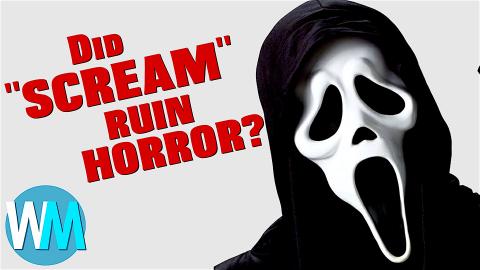How Scream Ruined Horror Movies!

The 90s hit film Scream was an instant classic and adored by fans, only problem is that its creation ruined all future horror films attempts, or did it? WatchMojo presents a video essay on whether or not Wes Craven's masterpiece destroyed a genre. Watch to find out how Scream changed the game for 1990s horror films!
Watch on Our YouTube Channel.
If you think you have an idea for what our next video could be, check out our suggest page here: http://WatchMojo.commy/suggest.php
The 60s had Norman Bates, the 70s had Michael Myers and the 80s had Freddy Krueger and Jason Voorhees. Yes, with these and countless other horror movie icons throughout the decades, the slasher genre was running stale on fresh ideas by the time it came to the 1990s. Enter “Scream”. A slasher flick so original, it ruined a whole genre.
Director Wes Craven, previously known for bringing to life horror classics such as “A Nightmare on Elm Street” and “The Hills Have Eyes” saw a new direction for the genre by the turn of the 90s. With the overabundance of the same old horror clichés, the genre needed something new, something that would respark the love that horror fans have for the genre. They needed to become self-aware.
While he experimented with adding an extra layer in “New Nightmare”, Craven would perfect the idea of the meta-film with 1996’s “Scream”. The “meta-film”, that got its start in the world of literature under the name “metafiction”, refers to the idea of an author, or in this case a director, constantly reminding the viewer that they are watching a film. Early examples of this type of storytelling are found in the work of Charlie Chaplin, and of Chuck Jones, who’s Looney Tunes short “Duck Amuck” showcases this concept perfectly. Bringing it back to horror, it’s the thing that turns a moment like this, into something that looks a little more like this…
Acknowledging the tropes of the genre and cramming in over-the-top jump scares that are sprinkled with just enough comedy is what made “Scream” the surprise hit of the 90s. Take the iconic opening scene for example. You may think this looks like your average slasher kill, but Craven is completely changing the way we think about horror here. Horror movie trivia serves as the backbone to Casey Becker’s death as she is asked to answer questions about canonized slasher films to survive. This is where Craven’s experience in horror comes in handy. Most people’s fear of horror movies stem from them assuming that characters have no knowledge to the rules that their killers play by. Of course, Craven inverts this trope in the opening sequence by giving the character an overall knowledge of how these conventions work, and thus, flipping audiences’ expectations on their head, leaving them to be the vulnerable ones.
“Scream” is simply built around this idea of audience expectation, and you would think that people would apply this to movies that were inspired by Craven’s classic, right? Well, unfortunately not. Not only did “Scream” spawn many disappointing original films such as “Urban Legend” and “I Know What You Did Last Summer”, but iconic slasher franchises such as “Child’s Play” and “Halloween” even took a “stab” at replicating the success of “Scream”, with rather mediocre execution. Where these films flop is that they’ve either taken too much or too little from what made “Scream” so great.
A film like “I know What You Did Last Summer” reverted back to the tropes that “Scream” aimed to poke fun at, without any of the self-awareness. “Scream” cleverly explains a rule, and the following film knowingly follows this rule like all the horror films before it. Contrast this with a more self-referential film like “Bride of Chucky” which ditched most of its slasher elements in favor of a comedic tone. The issue with this is, this kind of film relies on timing, and since “Scream” was fresh in people’s minds, the meta-film genre was already feeling as stale as the genre it was ripping on. For this reason, you could say that a meta film should stand on its own after an over-saturation of a genre. For every trend, there’s always a camp of people looking to make fun of it. Perhaps that’s why none of the “Scream” sequels were as critically successful as the original, or why the meta horror genre had seemed to die out by the turn of the century.
You can look at similar self-aware genre films to see this trend further. “Deadpool” did it for superhero movies, “Hot Fuzz” did it for action movies, and “The Cabin in the Woods” had a new take on horror in the 2010s. “Deadpool” for example, came at the peak of superhero mania, and only time will tell if its legacy will help the genre grow, or face similar faults to that of “Scream” and further oversaturate the market. If “Scream” has taught us anything, it’s that too much of a good thing is problematic, and that you should be very worried when this guy calls.
Want more from Watchmojo? Check out other great clips on our YouTube channel, and be sure to take a look at Magazine of the Top 100 Movie Moments of the 90s!
